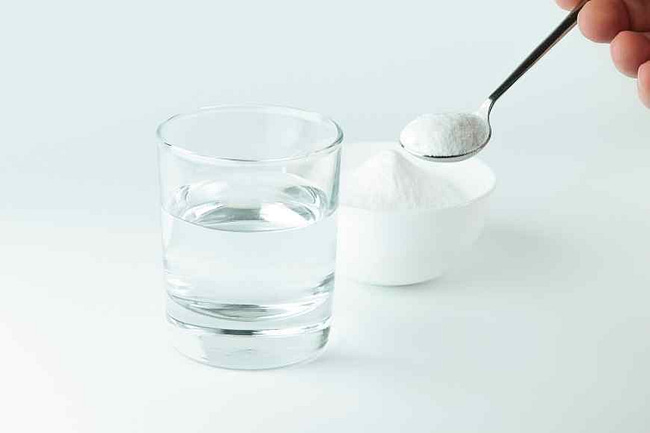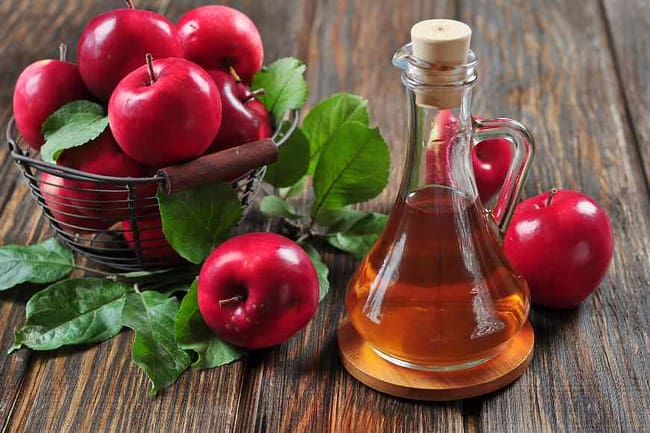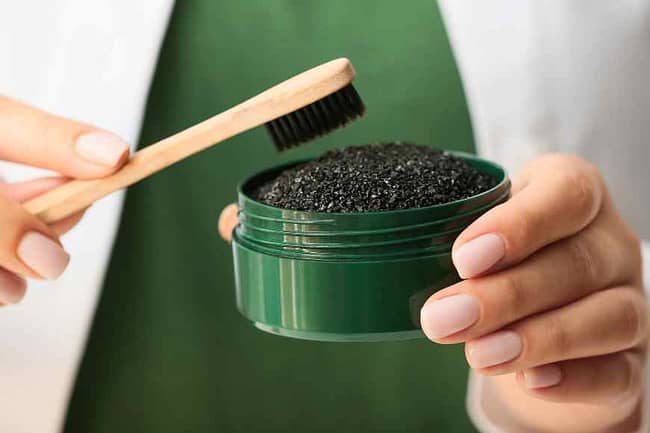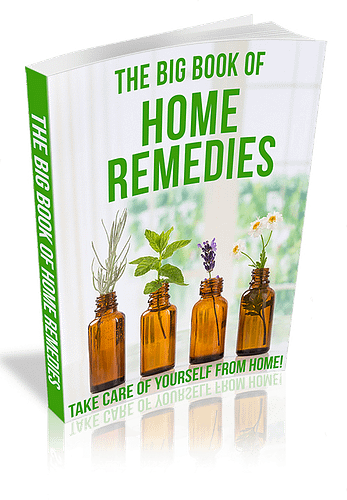Having yellow or discolored teeth can be embarrassing and affect your confidence in your smile.
Many factors can cause teeth to become dull and yellowed over time.
The good news is there are several effective natural remedies to whiten and brighten your smile again without resorting to expensive dental treatments.
In today's post, we'll cover the leading causes of yellow teeth and show you how to prevent further discoloration.
We'll also detail the top scientifically-proven home remedies and natural whitening methods to safely and gently get rid of stains without damaging your enamel.
From simple ingredients like baking soda and hydrogen peroxide to fruit acids and activated charcoal, these DIY teeth-whitening solutions can dramatically improve the appearance of your smile over time.

When coupled with good oral hygiene habits, natural teeth whitening can help you boost your confidence.
What Causes Yellow Teeth?
There are several potential causes of yellow or discolored teeth:
- Food and Drink Stains - Coffee, tea, red wine, and acidic foods can erode enamel and seep dark pigments into teeth over time. Common staining culprits are berries, tomato sauce, curry, and soy sauce.
- Tobacco Use - Smoking or chewing tobacco causes stubborn brown/yellow stains as tar and nicotine accumulate on teeth.
- Aging - As you age, the outer enamel layer of your teeth naturally becomes thinner, revealing the yellow inner dentin layer. Teeth often darken with age.
- Medications - Certain antibiotics like tetracycline can permanently stain teeth if taken by children whose teeth are still developing.
- Genetics - Some people naturally have thinner enamel or smaller teeth showing more yellow dentin. Intrinsic discoloration can also run in families.
- Trauma - If teeth suffer injury or trauma, it can interrupt dentin production, resulting in yellowing.
Now, let's look at preventing further yellowing and keeping your teeth pearly white.
Preventing Further Discoloration
While some causes of yellow teeth, like aging are inevitable, there are many ways to prevent additional discoloration and stains:
- Brush and floss thoroughly daily - Regular brushing and flossing removes plaque buildup and food debris that can stain teeth. Brush for 2 minutes twice per day, taking care to reach all surfaces. Floss at least once daily.
- Avoid staining foods and drinks - Beverages like coffee, soda, red wine, and dark juices will stain teeth over time. Limit consumption and drink them through a straw to reduce contact with teeth. Soy sauce, berries, tomato sauce, and balsamic vinegar are also common staining foods.
- Use non-alcohol mouthwash - Mouthwash reaches areas your toothbrush may miss, killing bacteria that cause plaque. Look for anti-bacterial rinses without alcohol, like cetylpyridinium chloride, that can help prevent stains.
- Drink more water - Water naturally washes away food particles and neutralizes acids that erode enamel. Drink water throughout the day, especially after consuming staining foods and drinks.
- Quit smoking - Tobacco is highly staining. The tar and nicotine in cigarettes, cigars, pipes, and chewing tobacco cause stubborn brown/yellow discoloration. Quitting can help reverse stains.
- Get professional cleanings - See your dentist for dental cleanings every six months to have plaque removed and teeth polished. Regular professional cleanings boost whitening.
- Use teeth whitening toothpaste - Whitening toothpaste gently lifts surface stains with mild abrasives and polishing agents. Look for brands with hydrogen peroxide for added whitening power.
You can prevent additional discoloration with diligent oral hygiene and limiting staining foods.
Next, we'll cover effective natural teeth whitening remedies to remove existing stains.
Natural Teeth Whitening Methods
In addition to maintaining good dental hygiene, there are many natural and home remedies that can effectively whiten teeth and get rid of stubborn stains without harsh chemicals.
These methods are affordable, easy to do at home, and gentle on your enamel.
Baking Soda and Hydrogen Peroxide
One of the most popular home whitening solutions is mixing baking soda with hydrogen peroxide to make a mild bleaching paste.

- Baking soda is a natural abrasive that scrubs away surface stains. Meanwhile, hydrogen peroxide is a mild bleaching agent that breaks down deeper discoloration.
- Mix a paste with equal parts baking soda and hydrogen peroxide. Apply a soft-bristled toothbrush and gently brush on discolored teeth for 1-2 minutes.
- Rinse thoroughly when finished. Use this technique once or twice per week for best results.
Apple Cider Vinegar

Apple cider vinegar contains acetic acid that helps dissolve stubborn stains and whiten teeth.
- Dilute raw, unfiltered apple cider vinegar in water. Swish the mixture in your mouth for 30 seconds before brushing as a cleansing rinse.
- You can also dip a cotton ball in apple cider vinegar and rub it directly onto stained teeth. Allow it to sit for 5 minutes before rinsing.
- Repeat this apple cider vinegar remedy 2-3 times weekly for gradual whitening.
Coconut Oil Pulling
The antibacterial properties of coconut oil help kill plaque and stain-causing bacteria in your mouth.
- Put about 1 tbsp of liquid coconut oil in your mouth and swish it for 10-20 minutes.
- Spit out the oil (which will look white and milky) and rinse your mouth. Do this daily or a few times per week.
- You can also combine coconut oil with a bit of baking soda to enhance the stain removal.

Coconut oil pulling can whiten teeth while also giving you fresher breath!
Strawberries
Strawberries contain a natural astringent called malic acid that can help lift surface discoloration and whiten teeth.
- Mash 2-3 ripe strawberries into a paste and apply directly to stained teeth using a toothbrush or your finger.
- Let it sit for 2-3 minutes before rinsing thoroughly with water.
- Repeat this 1-2 times per week for a brighter smile.
Activated Charcoal
Activated charcoal has become a popular natural teeth-whitening ingredient.

It works by absorbing toxins and stains before they can set into the pores of your enamel.
- Make a paste by mixing 1 tsp of activated charcoal powder with just enough water to form a thick mixture. Apply to teeth with a soft brush.
- Allow to sit for 1-2 minutes before rinsing thoroughly - be careful not to swallow any charcoal.
- Use this activated charcoal remedy sparingly 1-2 times per month to avoid overly abrasive scrubbing of enamel.
Bananas
Believe it or not, mashed bananas can be an effective teeth-whitening tool.
Bananas contain potassium, magnesium, and manganese that help scrub away stains on enamel.
- Mash up a ripe banana into a paste and brush it onto your teeth, allowing it to sit for 2 minutes.
- Rinse thoroughly afterward. Use this banana whitening treatment 1-2 times per week.
Be patient with natural teeth whitening remedies - it may take a few weeks of consistent use to see significant improvements in your smile!
Copy
Store-Bought Teeth Whitening Kits
In addition to natural DIY remedies, you can buy many over-the-counter teeth whitening products at pharmacies and grocery stores.

These include:
- Whitening Strips - Thin strips coated with hydrogen peroxide or carbamide peroxide that adhere to your teeth. Use for 30 minutes 1-2 times daily over a couple of weeks.
- Whitening Gels - Higher concentration peroxide gels often with trays to hold the gel against your teeth during application. Use for 10-30 mins daily for 1-2 weeks.
- LED Whitening Kits - Gel is applied alongside light devices that accelerate bleaching. Shorter 10-20 minute sessions.
- Whitening Toothpastes - Contain mild abrasives and low levels of hydrogen peroxide to gently polish away stains with regular brushing.
- Charcoal Powders - These can be mixed with water and applied with a brush for quick stain removal. Rinse thoroughly after using.
Over-the-counter whitening products are relatively affordable and easy to find.
However, they may irritate sensitive teeth. Discontinue use if you experience discomfort or increased sensitivity.
Consult your dentist first if you have dental concerns.
For dramatic whitening, professional treatments performed by your dentist provide the most effective option.
Professional Whitening Treatments
For fast, dramatic results, visit your dentist for professional whitening treatments.
These are often recommended for severe discoloration that over-the-counter methods can't fully resolve.
Professional options include:
- In-Office Bleaching - Your dentist will apply a high-concentration peroxide gel to your teeth and use an accelerated light or laser to trigger the whitening. Results are seen after just one 1-hour visit.
- Custom-Fit Trays - Your dentist makes customized plastic trays that perfectly fit your teeth. You're given a whitening gel with 10-15% carbamide peroxide to fill the trays and wear for 1-2 hours daily for 1-2 weeks.
- Combination Treatments - Some dentists offer a combination of in-office bleaching followed by at-home whitening trays to maximize results.
While professional whitening yields dramatic brightening quickly, the higher peroxide concentrations may temporarily increase tooth sensitivity or irritation.
Proper dental exams and cleanings should also precede whitening treatments.
Discuss options with your dentist to determine the safest, most effective whitening method based on the severity of discoloration and your oral health.
Professional whitening can significantly restore your smile when natural remedies don't suffice.
Conclusion
Yellow or discolored teeth can make you self-conscious about showing your smile.
Stains and dullness can accumulate from food, drink, tobacco, and simple aging.
While genetics and thinning enamel also play a role, you're not stuck with a lackluster smile.
You can gradually brighten your smile by consistently using natural teeth-whitening remedies like baking soda, coconut oil pulling, fruit acids, and activated charcoal.
Coupled with good brushing and flossing habits, avoiding staining foods, and getting regular dental cleanings, these DIY whitening techniques help prevent further discoloration.
For fast results, over-the-counter whitening strips, gels, and kinds of toothpaste can boost your brightness in just a couple of weeks.
For dramatic whitening, professional in-office or custom tray treatments performed by your dentist provide the most effective option when discoloration is severe.
With the affordable home remedies in this guide, you can gently but noticeably whiten teeth without the harsh chemicals found in some whitening products.
Try adding a few natural whitening methods into your dental care routine for the smile you deserve.
FAQ'S
Most natural whitening remedies need to be used for 2-4 weeks consistently to see noticeable results. Baking soda and hydrogen peroxide mixes provide quicker results while methods like coconut oil pulling act more gradually over time. Be patient and persistent.
Yes, ingredients like baking soda, strawberries, and activated charcoal are safe for enamel when used properly. Avoid over-scrubbing and limit acidic remedies like lemon juice. Whiten gently and rinse thoroughly. Discontinue use if you experience sensitivity.
Coffee, tea, red wine, berries, tomato sauce, soy sauce, dark sodas, and balsamic vinegar are common staining culprits. Limit consumption of these and be sure to brush or rinse your mouth after eating them.
Whitening toothpaste can help lift surface stains with mild abrasives and low-level whitening agents like hydrogen peroxide. However, dramatic whitening requires stronger methods. Toothpaste helps maintain brightness between whitening treatments.
Professional whitening is safe when done properly, but the higher peroxide concentration may temporarily increase sensitivity. Make sure you get dental exams and cleanings prior to whitening. Discuss options with your dentist based on the health of your teeth and gums.


